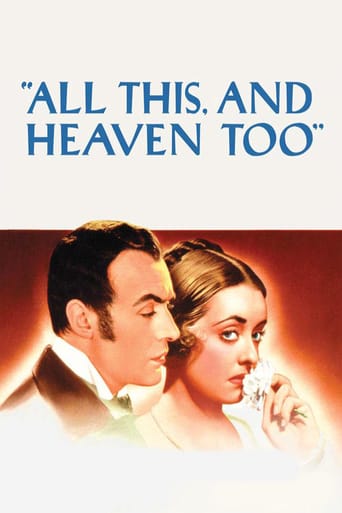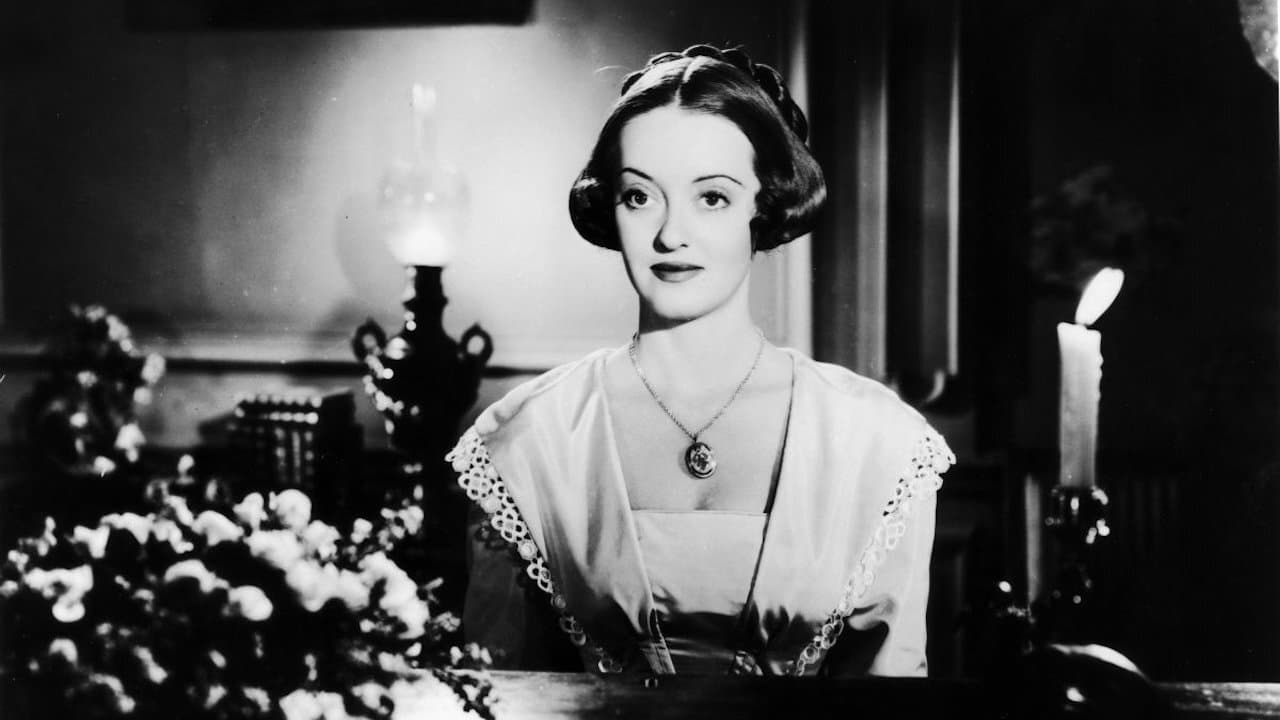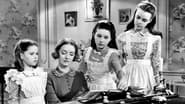haniaelrawy
I quote this line from Pierre's worthy advice for Henriette to leave the house before it's too late.Unfortunately she declined the advice and insisted on staying bringing catastrophic incidents on the whole family including the man she loved.I think that Henriette didn't really love Le Duc but she only admired his character as being decent gentle and a kind father.She tells Pierre that Le Duc is a fine gentleman. If it were a real sincere love Henriette would have left the house as soon as possible saving the children and the man she loved the tragic incidents that happened later
Charles Boyer's natural gift of subtle romantic performance remains insuperable.He stole the scenes whenever he appeared on the screen and the scene of his dying was really a masterpiece.I wonder why he is underappreciated and one can rarely find critics discussing or analysing his work.In fact the whole atmosphere of the movie is enchanting and captivating.I must admit that I am caught in the spell of the movie especially Boyer's magic performance and I don't even wish to escape.
SimonJack
I agree with those who think that this may be the best performance by Bette Davis in her long career. "All This, and Heaven Too" is based on a novel about a real event. Many truths about that event may never be known – more on that later. But the historical event aside, one can judge this film as the story is presented here. And in that regard, Davis is superb. She is a devoted governess who loves children and teaching. She plays a restrained character who tolerates abuse and bad behavior of the duchess. Davis was known for playing dramatic roles so well – to make her characters so real. Her role in this film as Henriette Deluzy-Desportes almost seems out of character. Yet, it's her patience, composure, and innocence that comes across so convincingly. All the time she seems to be acquiring an affection for the duke – empathy, respect, and possibly love. We see that only by the looks in her eyes.Charles Boyer plays the male lead, the Duc de Praslin. Barbara O'Neill gives an exceptional performance as the Duchesse de Praslin, for which she received an Academy Award nomination. Jeffrey Lynn plays Henry Martyn Field. Child star Virginia Weidler is the oldest of the children, Louise. Other supporting roles are fine.Davis didn't receive an Academy Award nomination for her role in this film, but she did for "The Letter." Perhaps her fellow movie makers couldn't see Davis in such a subdued role. Yet it may take more talent to pull that off than any role in which she could break into rage. But, 1940 was also a year of much competition. Three of the 10 films nominated for best picture are on most lists of top films of all time — "The Great Dictator," "Rebecca," and "The Grapes of Wrath." Among the best actresses nominated were Joan Fontaine, Katherine Hepburn, Martha Scott, and Ginger Rogers, who won the best actress Oscar for her role in "Kitty Foyle." "All This, and Heaven Too" was based on a 1938 novel by American writer Rachel Field. She was a grandniece of Henriette Desportes. Henriette immigrated to the U.S. three months after the Aug. 17, 1847 murder of the Duchess de Praslin. She became principal of the Female Art School at the Cooper Union. She met and married the Rev. Henry M. Field in 1851 – after telling him of her past. She was a respected member of New York society when she died in 1874.The Paris scandal occurred six years after Henriette became governess of the de Praslin children. The duchess, Fanny Sebastiani, was from a wealthy family and became titled when she married the duke. The Duke de Chisel-Praslin (Charles Laure Hugues Theobald) had the title, but little wealth. The couple had nine children – not five, as in the movie. Theobald and Fanny became estranged over time. By the movie account, that began well before Henriette arrived. The children were very attached to the governess. The duchess resented that and argued with the duke. She accused him of having an affair with the governess. Through her father, the duchess forced the dismissal of Henriette after six years.It was some time later that the duchess was brutally murdered in her room. There was little doubt that the duke had killed her. She had 40 wounds on her body, and blood was everywhere. The Duke was covered with bruises, scratches and bite marks. But, before he could be brought to trial, he took arsenic and died a week later. Henriette was cleared of any suspicion and released from jail after being held for three months.Rachel Field's novel portrays her great aunt as the picture of innocence, which the movie conveys. Yet, the movie differs from facts in places, including the number of children. Popular belief among the French of the time was that the governess and Duke were having an affair. The truth may never be known to the satisfaction of all, but there is sufficient detail to vindicate Henriette of complicity in the murder and of an affair with the Duke.The police found volumes of letters the duchess had written to the Duke in her room. These accused him of an affair, and of the governess alienating the affection of her children. How did she come to have these letters if she had sent or given them to the Duke? How could a governess steal the affections of nine children away from a mother who loved them? It seems strange that nothing more was heard of the children. They went to live with their maternal grandfather. No doubt he would want to protect his daughter's (the duchess) reputation. But the children were never questioned by authorities, and none apparently ever wrote about this tragic matter in their lives.Why would a young woman take up a position as governess to nine children, and in a household in which there was animosity or strife between the spouses? Surely not with any inclination to enter into an affair with the husband. How could the duke and governess have an affair in a household with nine children and many servants and not be seen by those people? The couple had nine children, so clearly at some time they must have had an amorous relationship.All of the truth about this episode may never be known. But, it does seem that the duchess and duke both may have been mentally unstable – possibly crazy. He seems to have gone mad by his bizarre, brutal murder of his wife. But in the end, justice may indeed have been served with Henriette's new life in America. The sad chapter that the film never addresses, is the de Praslin children and what happened to them after this tragic affair in their lives.
richard-1787
This movie has all sorts of weaknesses: it is at times extremely melodramatic, etc. I will leave it to others to detail all those faults.What this movie does well, and very well, is make a case for tolerance of moral difference. In the course of telling her story to her students, Bette Davis' character turns a bunch of priggish American girls into a group of compassionate young women. She shows, in other words, the power of a well-told story in developing compassion for others - just the sort of thing Warner Brothers did with its best movies. It makes a clear differentiation between France (of the 1840s, granted) and the United States and suggests very clearly that the US is, among other things, the land of such moral tolerance.Today, of course, as the US becomes ever more morally intolerant while France goes the other way that seems no little ironic. It also reminds at least this viewer that today's movie studios, lead by corporations and not individual owners, are much less committed to this sort of "movie with a message" than Warner Brothers was back in the day when it was in fact the product of Jack and Harry Warner, who had a very definite social agenda they wanted to promote.This movie is too long, it is sometimes excessively melodramatic. But it has its heart in the right place, and if you sit through it to the end, you realize that that is a place very relevant to today.Not a great movie, but a moving one.
s-diblasicrain
I am having a hard time finding the words to explain just how much I detested this movie. The historical trial of Henriette Deluzy-Desportes and the Duc de Praslin is a tragic and compelling story that, I feel, had the potential to be a fantastic film, but failed. Although the cinematography certainly had something to say for itself, it in no way could make up for the terrible structure of the film, the badly written script and most of all the horrendously overacted characters. The worst of them were the Duc's children who were so over-the-top-corny and sickeningly fake that it was almost painful to watch.In conclusion, this film left me feeling nothing more than irritated and profoundly disappointed.



 AD
AD







